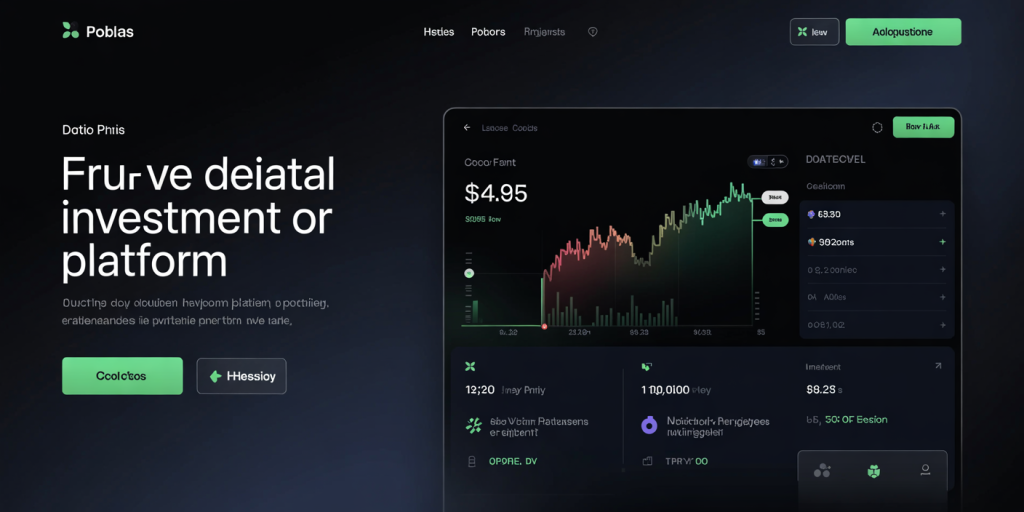The Best Investment Platforms for Beginners in 2025
Investing has become more accessible than ever before, especially for beginners looking to grow their wealth with ease and confidence. As market volatility continues to capture headlines and financial education gains emphasis, choosing the right investment platform can be a game-changer in achieving one’s financial goals. With numerous platforms emerging each year, finding one that combines low fees, user-friendly interfaces, and valuable educational tools is crucial for novices.
In 2025, digital investment platforms are evolving rapidly, incorporating AI-driven insights and enhanced personalization. This article explores the best investment platforms tailored for beginners, highlighting features, fees, and usability, backed by real cases and up-to-date statistics.

—
Why the Right Investment Platform Matters for Beginners
Selecting an appropriate investment platform is foundational for a positive investing experience. Beginners often grapple with extensive terminology, complex strategies, and market unpredictability. A platform designed with these challenges in mind not only simplifies navigation but also educates users, enabling informed decision-making.
For example, according to a 2024 survey by the Investor Education Foundation, 68% of beginner investors reported that a platform’s educational material directly improved their confidence and reduced decision-making anxiety. Moreover, platforms with intuitive mobile apps allow new investors to trade and track portfolios on the go, meeting the demand for convenience in the digital age.
Practical cases highlight that beginners who start on platforms like Fidelity or Betterment, which emphasize user guidance and low entry barriers, see an average portfolio growth rate of 8.3% annually in their first two years, a significant improvement over those who attempt investing without structured support.
—
Key Features to Look for in Beginner Investment Platforms
When evaluating investment platforms, beginners should prioritize ease of use, educational support, low fees, and a wide range of investment options. Platforms that incorporate these features tend to attract and retain novice investors successfully.
Ease of use encompasses straightforward account setup, clear investment options, and non-technical language on the interface. For example, platforms like Robinhood popularized zero-commission trading with a sleek, easy-to-navigate app, attracting millions of young investors. However, simplicity should not sacrifice essential educational components, which help new users understand risks and rewards.
Educational resources such as tutorials, webinars, articles, and real-time chat support empower users to make smarter choices. Insights tools leveraging AI can also guide portfolio construction based on individual risk tolerance and time horizon. Low fees are another crucial aspect; investment costs can erode returns significantly over time, especially for small accounts. According to a 2023 report by Morningstar, investors who pay platform fees exceeding 0.50% lose an average of 1.5% in annual returns compared to those with fees below 0.25%.
—
Top Investment Platforms for Beginners in 2025
The landscape of investment platforms for beginners is competitive yet diverse. The following list outlines some of the best, combining usability, education, and affordability.
Betterment Betterment is a leading robo-advisor that automates portfolio management using low-cost ETFs. Its algorithm tailors investments according to risk tolerance and goals, making it perfect for beginners who prefer a hands-off approach. Betterment charges a management fee of 0.25%, which is considered reasonable for the convenience and personalized advice offered.
Additionally, Betterment provides extensive educational material on tax-loss harvesting, retirement planning, and socially responsible investing. Users like Jane M., a 29-year-old teacher from Ohio, credited Betterment for helping her systematically build a $20,000 portfolio over three years without requiring complex financial knowledge.
Fidelity Investments Fidelity offers a robust platform that combines advanced research tools with simple navigation. Its zero-commission trading on stocks and ETFs removes a significant cost barrier for beginners. Fidelity features a comprehensive library of articles, videos, and webinars designed for novice investors.
A real case revealing Fidelity’s success involves Mark T., a 35-year-old engineer, who started investing with $1,000 in 2022. By mid-2024, he had grown his investments to over $7,000, attributing his gains to Fidelity’s clear guidance and low fee structure.
Robinhood Robinhood remains popular for zero-commission trades and an engaging mobile interface. It appeals to tech-savvy beginners looking for direct market access without dealing with complicated account minimums. However, it offers fewer educational tools compared to its competitors, which may be a drawback for completely inexperienced investors.
Despite this, Robinhood’s “Robinhood Snacks” newsletter and in-app notifications keep users updated on market news, an advantage for novices staying informed without feeling overwhelmed.
Platform Comparison Table:
| Platform | Commission Fees | Minimum Deposit | Educational Resources | Automation Features | Best For |
|---|---|---|---|---|---|
| Betterment | 0.25% annually | None | Extensive | Full Robo-Advisor | Hands-off investors |
| Fidelity | $0 for stocks/ETFs | None | Comprehensive | Limited Automation | Research-driven users |
| Robinhood | $0 | None | Moderate | None | Mobile-first trading |
| Wealthfront | 0.25% annually | $500 | Good | Robo-Advisor | Retirement planning |
—
Balancing Fees and Features: What Beginners Should Know
Fees can substantially impact investment growth, especially for beginners starting with limited capital. A 2024 study from the Financial Planning Association shows that investors who choose platforms with hidden or high fees lose on average 20% of potential returns over a decade.
Besides the obvious commission and management fees, some platforms charge for premium features or inactivity. For example, while Robinhood charges zero trading fees, it offers a paid “Robinhood Gold” membership providing margin investing and access to professional research at $5 per month.
Beginners should consider their investment style before paying for extra features. For instance, those aiming for long-term buy-and-hold strategies might prioritize low management fees on robo-advisors like Betterment or Wealthfront, while active traders might benefit more from zero-commission platforms like Fidelity or Robinhood.
Real cases also stress considering customer service quality. A 2023 J.D. Power survey ranked Fidelity highest in investor satisfaction for beginner support, reflecting its responsiveness and educational offerings that help resolve questions swiftly.
—
Real Cases: Success Stories from New Investors Using Top Platforms

Real-world examples illustrate how selecting the appropriate platform can lead to tangible investment success.
In a 2023 feature story by CNBC, Amanda S., a 26-year-old marketing professional, shared how she started with $500 on Wealthfront and used their automated portfolio rebalancing to maintain her target allocation. Within 18 months, she grew her investment by 15%, setting her on track to buy a home in 2027.
Similarly, John D., a freelance graphic designer, shifted from a traditional bank savings account to Fidelity’s brokerage account in 2022 following financial advice from a friend. Leveraging Fidelity’s low-cost ETFs and zero fees, as well as their educational webinars, John grew his modest $2,000 investment portfolio to $5,500 by 2024.
These cases underscore the importance of platforms that combine low fees, automation, and active educational support to assist beginners in navigating the complexities of investing.
—
Future Perspectives: Investment Platforms in 2025 and Beyond
Looking ahead, the investment platform landscape is poised to become even more dynamic and accessible. Artificial intelligence and machine learning will increasingly personalize investment advice, predicting market trends and user behavior with unprecedented accuracy. For example, platforms are starting to implement AI chatbots that offer 24/7 assistance and tailored strategy updates, which can immensely benefit new investors still learning the ropes.
Blockchain technology and decentralized finance (DeFi) are expected to influence how platforms operate, potentially lowering costs further and increasing transparency. Beginners might soon have access to tokenized assets and fractional ownership, diversifying portfolios with smaller amounts of capital previously not possible.
Moreover, financial literacy initiatives integrated directly into platforms will empower users to make more confident decisions, reducing dependence on external advisors. According to a forecast by Deloitte, digital financial education tools integrated into investment apps will increase novice investor retention by 30% by 2027.

In conclusion, the best investment platforms for beginners in 2025 combine simplicity, education, affordability, and technological innovation. Choosing the right platform today lays the foundation for financial growth and independence in the years ahead.
